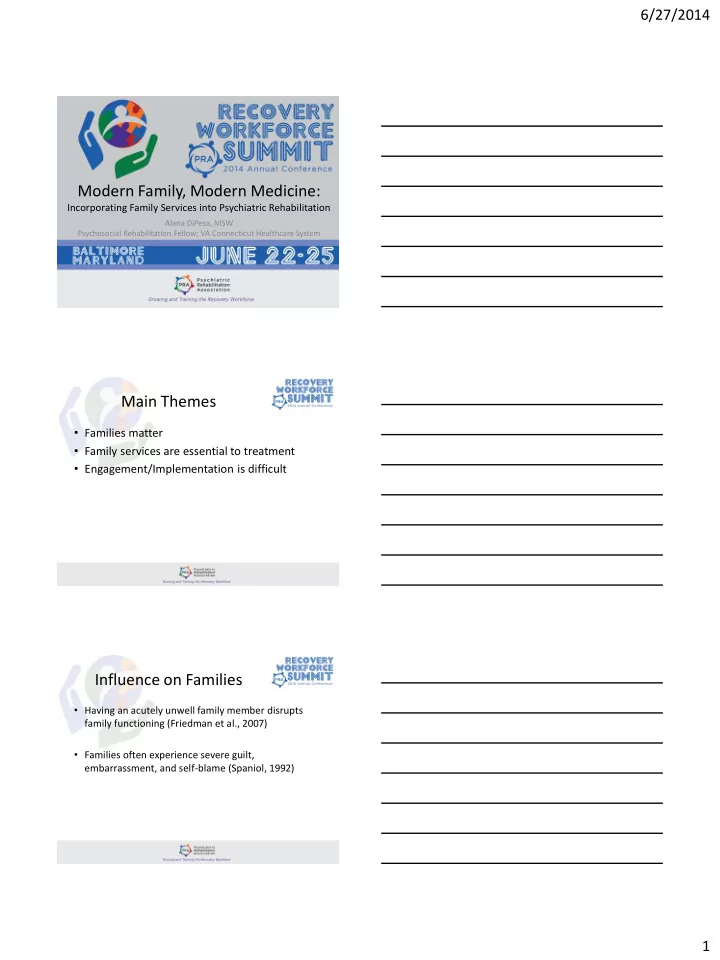

6/27/2014 Modern Family, Modern Medicine: Incorporating Family Services into Psychiatric Rehabilitation Alana DiPesa, MSW Psychosocial Rehabilitation Fellow; VA Connecticut Healthcare System Main Themes • Families matter • Family services are essential to treatment • Engagement/Implementation is difficult Influence on Families • Having an acutely unwell family member disrupts family functioning (Friedman et al., 2007) • Families often experience severe guilt, embarrassment, and self-blame (Spaniol, 1992) 1
6/27/2014 Source: www.extension.umn.edu Influence on Families • Families provide the bulk of care and support (Lakeman, 2008) • Frequently lack the knowledge, skills, and support system required to provide specialized mental health care (Bernheim et al. 1982) 2
6/27/2014 Influence on Families Families’ Influence on Recovery • Coaching around daily-living and problem solving skills • Assist in administering medication • Monitor medication side-effects • Family gatherings provide social opportunities • Encourage and support friendships • Support vocational/educational initiatives (Spaniol, 1992) Families’ Influence on Recovery 3
6/27/2014 Families’ Influence on Recovery • Reduces relapse and readmission rates • Improves involvement and adherence • Produces positive outcomes for caregivers • Improved morale • Better knowledge of mental illness • Feeling of empowerment • Reduced worry/displeasure about loved ones (Sherman, 2003) Influence of Families on Recovery • Medical treatment of mental illness is greatly enhanced with family interventions (Bustillo et al ., 2001) • Family interventions are cost-effective (Mithalopoulos et al. , 2004) • Community mental health care is enhanced through family collaboration (McFarlane, 1997) Discussion • How have you seen families involved in mental health treatment? • What do you see as the influence of families on psychosocial rehabilitation? 4
6/27/2014 Families of Veterans Families of Veterans CNN article, “The Uncounted” by Ashley Fantz http://www.cnn.com/interactive/2014/03/us/uncounted-suicides/ The Wife CNN article, “The Uncounted” by Ashley Fantz http://www.cnn.com/interact ive/2014/03/us/uncounted- suicides/ 5
6/27/2014 The Daughter CNN article, “The Uncounted” by Ashley Fantz http://www.cnn.com/interact ive/2014/03/us/uncounted- suicides/ Resources for Families of Veterans • http://www.milspousesofstrength.org/ • https://couragebeyond.org/ • http://www.militaryonesource.mil/ 6
6/27/2014 VA Family Services VA Family Services • Caregivers and Veterans Omnibus Health Services Act of 2010 • Programs across the country (San Diego, Eastern Colorado, Puget Sound, Boston, L.A.) • Access to Evidence Based Practices • Research • Caregiver Support Program VA Family Services 7
6/27/2014 VA Connecticut Family Services • Local child guidance center: Clifford Beers • Family Night • Couples therapy • Caregiver’s Support Program • Evidence-based practices • Family Resources Committee Project Implementation Needs Assessment Ongoing survey of Veterans receiving mental health services at VA Connecticut 42 Veterans surveyed thus far Project Implementation Needs Assessment: • Who is a part of Veteran’s family • Influence of family on mental health • Influence of mental health on family • Potential programming at VACT for families • Barriers that may prevent engagement 8
6/27/2014 Project Implementation • 52% identified “children” as their family • 48% identified “spouses” and “friends” • Less than half indicated that their families influence their mental health and vice versa Project Implementation Needs Assessment 33% Support group for families of Veterans 31% Educational classes 26% Couples counseling 24% Family therapy 38% “No, I would not want my family to be involved in any way” Project Implementation Needs Assessment Identified barriers: 38% “I don’t think family issues are as important” 29% “Timing (i.e. we would need a late session)” 9
6/27/2014 Project Implementation Needs Assessment Why these results? -population of Veterans interviewed -wording of questions -closed answers How do my results compare? Project Implementation Family Group 8 session protocol – Open group; drop-in model – Psychoeducational, supportive – Didactic component followed by group discussion – Based on Michelle Sherman’s Support and Family Education (S.A.F.E.) program Project Implementation Family Group Goals: • Teach about symptoms and course of mental illness • Opportunity to ask questions • Reduce stigma; obtain support from peers • Publicize mental health services • Early intervention and open communication • Link families with resources (Sherman, 2006) 10
6/27/2014 Project Implementation Family Group Session Protocol Example 1. Overview of the group 2. Review goals of the program 3. Discuss confidentiality and limitations 4. Affirm family member’s dedication 5. Introductions 6. Check-in/update 7. Didactic presentation 8. Group discussion 9. Wrap up/review of resources Project Implementation Family Group Didactic Presentations: What causes mental illness? Depression and its impact on the family PTSD and its impact on the family Schizophrenia/Psychosis and its impact on the family Communication tips for families Self-care for caregivers/managing stress Telling others about our loved one’s diagnosis Tips to help make holidays/special occasions pleasant Project Implementation Family Group Beginning Stages Approval Logistics (location, supervision, documentation) Recruitment 11
6/27/2014 Project Implementation Family Group Recruitment Project Implementation Barriers • Veterans’ own beliefs • Families’ logistical barriers – Practical Barriers (transportation, scheduling, etc.) – “Daily Stressors” – Psychological/Cultural barriers Discussion • How are family services being implemented at your various locations? • Have you encountered any barriers in implementation? If so, what were they? • How might this project description inform your services moving forward? 12
6/27/2014 Lessons Learned Lessons Learned • Systems change is hard • Start at the “point of entry” • Education for colleagues and clinics • Make changes to forms/tools • Extensive outreach to families Thanks! • Psychosocial Rehabilitation Association • VA Connecticut Healthcare System • Sandy Resnick, Ph.D • Meaghan Leddy, Ph.D • Anne Klee, Ph.D • Theresa Schmitz, Ph. D • Justine Janis, Stephanie Riccardi, Jen Gaskins, Alex Biondolillo 13
Recommend
More recommend